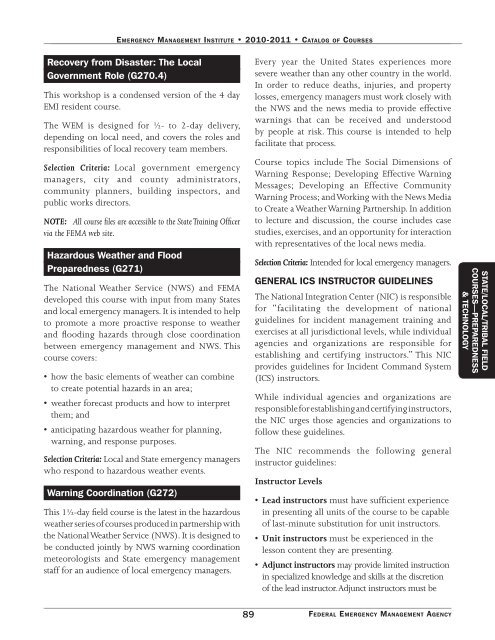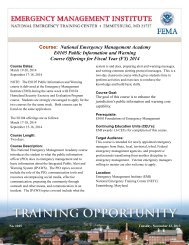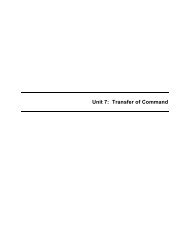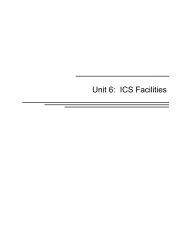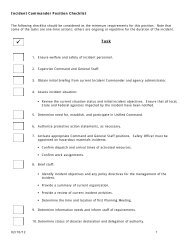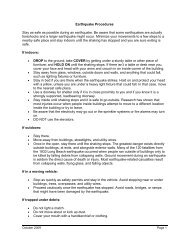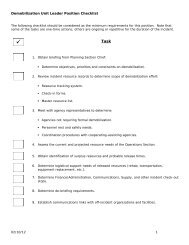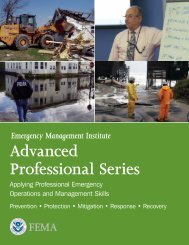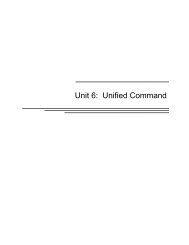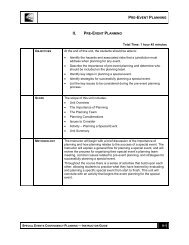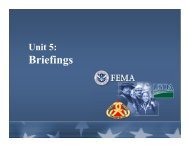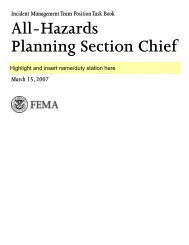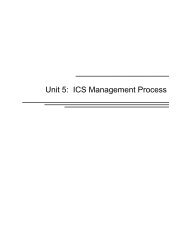enrollment for emi courses - Emergency Management Institute ...
enrollment for emi courses - Emergency Management Institute ...
enrollment for emi courses - Emergency Management Institute ...
Create successful ePaper yourself
Turn your PDF publications into a flip-book with our unique Google optimized e-Paper software.
EmE r g E n c y ma n a g E m E n t In s t I t u t E • 2010-2011 • ca t a l o g of co u r s E s<br />
recovery from Disaster: the local<br />
government role (g270.4)<br />
This workshop is a condensed version of the 4 day<br />
EMI resident course.<br />
The WEM is designed <strong>for</strong> ½- to 2-day delivery,<br />
depending on local need, and covers the roles and<br />
responsibilities of local recovery team members.<br />
Selection Criteria: Local government emergency<br />
managers, city and county administrators,<br />
community planners, building inspectors, and<br />
public works directors.<br />
NOTE: All course files are accessible to the State Training Officer<br />
via the FEMA web site.<br />
Hazardous weather and flood<br />
preparedness (g271)<br />
The National Weather Service (NWS) and FEMA<br />
developed this course with input from many States<br />
and local emergency managers. It is intended to help<br />
to promote a more proactive response to weather<br />
and flooding hazards through close coordination<br />
between emergency management and NWS. This<br />
course covers:<br />
• how the basic elements of weather can combine<br />
to create potential hazards in an area;<br />
• weather <strong>for</strong>ecast products and how to interpret<br />
them; and<br />
• anticipating hazardous weather <strong>for</strong> planning,<br />
warning, and response purposes.<br />
Selection Criteria: Local and State emergency managers<br />
who respond to hazardous weather events.<br />
warning coordination (g272)<br />
This 1½-day field course is the latest in the hazardous<br />
weather series of <strong>courses</strong> produced in partnership with<br />
the National Weather Service (NWS). It is designed to<br />
be conducted jointly by NWS warning coordination<br />
meteorologists and State emergency management<br />
staff <strong>for</strong> an audience of local emergency managers.<br />
89<br />
Every year the United States experiences more<br />
severe weather than any other country in the world.<br />
In order to reduce deaths, injuries, and property<br />
losses, emergency managers must work closely with<br />
the NWS and the news media to provide effective<br />
warnings that can be received and understood<br />
by people at risk. This course is intended to help<br />
facilitate that process.<br />
Course topics include The Social Dimensions of<br />
Warning Response; Developing Effective Warning<br />
Messages; Developing an Effective Community<br />
Warning Process; and Working with the News Media<br />
to Create a Weather Warning Partnership. In addition<br />
to lecture and discussion, the course includes case<br />
studies, exercises, and an opportunity <strong>for</strong> interaction<br />
with representatives of the local news media.<br />
Selection Criteria: Intended <strong>for</strong> local emergency managers.<br />
gEnEral Ics InstructOr guIDElInEs<br />
The National Integration Center (NIC) is responsible<br />
<strong>for</strong> “facilitating the development of national<br />
guidelines <strong>for</strong> incident management training and<br />
exercises at all jurisdictional levels, while individual<br />
agencies and organizations are responsible <strong>for</strong><br />
establishing and certifying instructors.” This NIC<br />
provides guidelines <strong>for</strong> Incident Command System<br />
(ICS) instructors.<br />
While individual agencies and organizations are<br />
responsible <strong>for</strong> establishing and certifying instructors,<br />
the NIC urges those agencies and organizations to<br />
follow these guidelines.<br />
The NIC recommends the following general<br />
instructor guidelines:<br />
Instructor Levels<br />
• Lead instructors must have sufficient experience<br />
in presenting all units of the course to be capable<br />
of last-minute substitution <strong>for</strong> unit instructors.<br />
• Unit instructors must be experienced in the<br />
lesson content they are presenting.<br />
• Adjunct instructors may provide limited instruction<br />
in specialized knowledge and skills at the discretion<br />
of the lead instructor. Adjunct instructors must be<br />
FEd E r A L Em E r g E N C y mA N A g E m E N T Ag E N C y<br />
statE/lOcal/trIbal fIElD<br />
cOursEs—prEparEDnEss<br />
& tEcHnOlOgy


